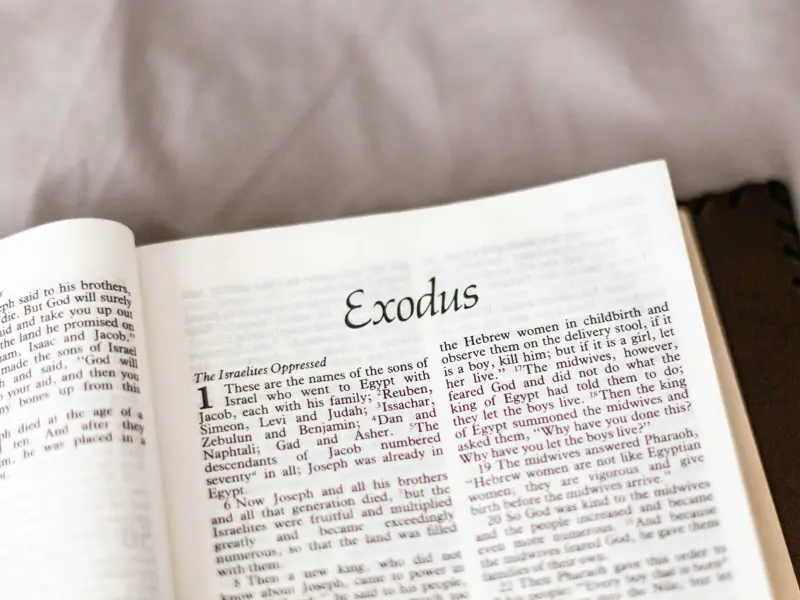In most of the articles, blog posts, and sermons I’ve read, Shiphrah and Puah (Exodus 15) have been lauded for their faith in God, but it was their fear or awe of Him that led to their actions. Certainly, Shiphrah and Puah, along with all of the Hebrew midwives they represent, had heard about Abraham, Isaac, and Lot. When they were little girls, they must have learned about the wrath of God during the time of Noah. And they had likely heard about the Tower of Babel, and the destruction of the cities of Sodom and Gomorrah. These women understood that the God of their forefathers possessed an unimaginable arsenal of power. He was not only a judge but also a jury, dispensing justice on wayward humans. It was through the telling of their ancestor’s history that they learned to fear God. So, they dared not anger Him.
From a personal perspective, the Hebrew midwives were able to witness God’s power and passion in the miracle of birth. With the cries of each newborn, a deep appreciation for the sanctity of life must have flooded their hearts. They understood that the God who punished people also created them. In a patriarchal society where women were not counted, were bought and sold with a dowry, were valued according to their ability to give birth to a son, and were dependent on the men in their lives for survival, the Hebrew midwives found themselves in a precarious situation. They were members of a race of people that had multiplied from seventy of Joseph’s family members (Gen. 46:26-27) who relocated to Egypt during the great famine (Gen. 41:53-57). In Exodus 1:9, the Pharaoh exclaimed that they were “more and mightier than we.” The Pharaoh knew nothing of their God, or Joseph and his brothers. So, he decided to reduce their numbers. He summoned the Hebrew midwives (Shiphrah and Puah) and commanded them to kill the Hebrew baby boys at birth (Ex.1:16). Verse 17 says, “but the midwives feared God, and did not do as the king of Egypt commanded them, but saved the male children alive.”
They had been ordered by the most powerful man in the land to destroy what they knew was the work of God. They found themselves standing between two opposing powers, that of a powerful God they feared and a powerful man they feared. So they devised a plan to save the male babies and themselves. They lied. Saving the babies took courage. But lying to the Pharaoh was cowardly.
I have often wondered what might have happened if the midwives had trusted God with their lives and admitted to the Pharaoh that they had purposely disobeyed him.
I have often wondered what might have happened if the midwives had trusted God with their lives and admitted to the Pharaoh that they had purposely disobeyed him. Like Meshach, Shadrach, and Abednego who stood before King Nebuchadnezzar.
There are several times in scripture when God strategically placed his people on the dividing line between faithlessness and faithfulness, and then waited to see what they would choose. Every time they trusted Him, God came through miraculously. Look at Moses and the Israelites when they had the Red Sea at their backs and Pharaoh’s army in hot pursuit (Gen. 14). No one expected God to open the Red Sea so that His people could cross on dry land. But because they had obediently followed God to that very spot, He delivered them and shamed the Pharaoh. Remember Daniel who emerged from a den of lions unscathed, because of his faithfulness to his God. And once again, a heathen king made a declaration of faith.
If our God whom we serve is able to deliver us from the furnace of blazing fire and out of your hand, O king, let him deliver us. But if not, be it known to you, O king, that we will not serve your gods and we will not worship the golden statue that you have set up.
The result of their profession of faith provided God with an opportunity to demonstrate His faithfulness and power. In Daniel 3:28-29, an astonished heathen King proclaimed, Nebuchadnezzar said, “Blessed be the God of Shadrach, Meshach, and Abednego, who has sent his angel and delivered his servants who trusted in him. They disobeyed the king's command and yielded up their bodies rather than serve and worship any god except their own God. Therefore I make a decree: Any people, nation, or language that utters blasphemy against the God of Shadrach, Meshach, and Abednego shall be torn limb from limb, and their houses laid in ruins; for there is no other god who is able to deliver in this way."
There are several times in scripture when God strategically placed his people on the dividing line between faithlessness and faithfulness, and then waited to see what they would choose. Every time they trusted Him, God came through miraculously. Look at Moses and the Israelites when they had the Red Sea at their backs and Pharaoh’s army in hot pursuit (Gen. 14). No one expected God to open the Red Sea so that His people could cross on dry land. But because they had obediently followed God to that very spot, He delivered them and shamed the Pharaoh. Remember Daniel who emerged from a den of lions unscathed, because of his faithfulness to his God. And once again, a heathen king made a declaration of faith. King Darius said, “I make a decree that in every dominion of my kingdom men must tremble and fear before the God of Daniel. For He is the living God, and steadfast forever; His kingdom is the one which shall not be destroyed, and His dominion shall endure to the end (Dan. 6:26).”
Needless to say, Shiphrah and Puah did not have the benefit of the stories I mentioned above to stir their confidence in the saving power of God. The women preceded those stories by hundreds of years. And nothing in their life experiences gave them any reason to believe God would take their side against a man, especially since they had been taught that God had established their station in life. But that doesn’t diminish the fact that God had handed them the unique opportunity to be the first women through whom He could demonstrate His saving grace.

We can only speculate, of course, but if God had been given the chance to come to their rescue, the Israelites may not have suffered so long in bondage, and the Egyptians may not have had to endure ten plagues. Perhaps a more amicable separation could have taken place. Of greater significance, however, is the possibility that Hebrew women might have been held in higher esteem by their male counterparts once they saw God’s impartial treatment of them.
Look for example at Zelophehad’s five daughters. Their father “died in the wilderness…and he had no sons (Num. 27:3).” Because they were women, they were not counted in the census and therefore, not eligible to inherit land. Zelophehad’s daughters wisely interpreted the laws of their day regarding inheritances, and then bravely “stood before Moses, Eleazar the priest, the chieftains, and the whole assembly, at the entrance of the Tent of Meeting (Num. 27:2),” to argue their case. They said, “Let not our father’s name be lost to his clan just because he had no son! Give us a holding among our father’s kinsmen! (Num. 27:4).” Moses brought their case before the Lord and the Lord spoke to Moses saying, “The daughters of Zelophehad speak what is right; you shall surely give them a possession of inheritance (Num. 27:7).” Had these women remained silent, they would not have become land owners.
We can only speculate, of course, but if God had been given the chance to come to their rescue, the Israelites may not have suffered so long in bondage, and the Egyptians may not have had to endure ten plagues.
Even though Shiphrah and Puah were not able to muster the courage to admit their actions to the Pharaoh, Exodus 1:20-21 tells us, “therefore, God dealt well with the midwives, and the people multiplied and grew very mighty. And so it was, because the midwives feared God, that He provided households for them.” It is safe to conclude that God was providing households for all of the Hebrew women. That is what led to their ballooning population in the first place. The point of verses 20-21, therefore, is to assure us that the midwives suffered no repercussions from the Pharaoh or the Lord.
There is a lot we can learn from Shiphrah and Puah. They were aware of the power of God, and they knew He could create life and destroy it. For them, it appears, these truths were not up for debate. They were certain of God’s ability, and willingness, to condemn and destroy. But it never occurred to them that their God was as willing to save and deliver. So their knowledge of God was incomplete, and as far as we know, it remained that way.
What Shiphrah and Puah show us is that there is a wide expanse between fearing God and trusting Him. Anyone who has been oppressed knows that those who are powerful may use that power against them. So, for them, trust is harder to achieve. Fearing God is a good place to start (Prov. 9:10), but if you want to experience His power at work in your life, you must trust Him. While the journey from fearing God to trusting Him may be a lifelong endeavor for some, depending on their circumstances, it is one worth taking. It is only after you have reached the milestone of trust that you can truly come to know God.

About the author
Denise Logan
Dr. Denise Logan is a pastor, writer, speaker, photographer, graphic designer, and fine artist. She obtained a Doctor of Ministry degree from Northeastern Seminary in May of 2020.